US election: Democrats face road to Damascus, Bernie Sanders or bust
What looms in this Democratic brawl is a fork in the road for American liberals.

If the polls are to be believed, we may be only months away from one of the most extraordinary political contests in US history — a democratic socialist in Bernie Sanders versus a billionaire pro-capitalist in Donald Trump.
But while the 78-year-old Sanders is the clear frontrunner for the Democrat nomination, he still has three serious moderate rivals chasing him in Joe Biden, Michael Bloomberg and Pete Buttigieg.
We will know as soon as Wednesday in Australia — after the South Carolina primary on Saturday in the US and the Super Tuesday primaries involving 14 states — whether any of these three have a realistic hope of catching Sanders before the Democrat convention in Milwaukee in July.
The desperation of Sanders’s rivals is palpable and was laid bare on national television in this week’s wild brawl of a debate between the seven candidates.
Sanders’s path towards victory has been helped by the fact that, until this week, his Democrat rivals have targeted everyone but him. For most of last year, the sprawling field of contenders set their sights on the early frontrunner, former vice-president Joe Biden. Then they focused on Elizabeth Warren when she briefly assumed the frontrunner mantle. After he won the Iowa caucus last month they suddenly focused on young former mayor Pete Buttigieg and then, in last week’s debate in Las Vegas, they directed their attacks at the newcomer, billionaire Michael Bloomberg.
Sanders, despite having the riskiest policy agenda of any of the contenders, glided to the lead in Steve Bradbury fashion as his more moderate rivals were shooting each other down. He has built a grassroots movement around his big-spending policies and attracts frenzied stadium crowds, an army of millennial volunteers, a rich vein of donors and strong support nationwide. Now he has momentum on his side after his wins in New Hampshire and Nevada, and a narrow second in Iowa.
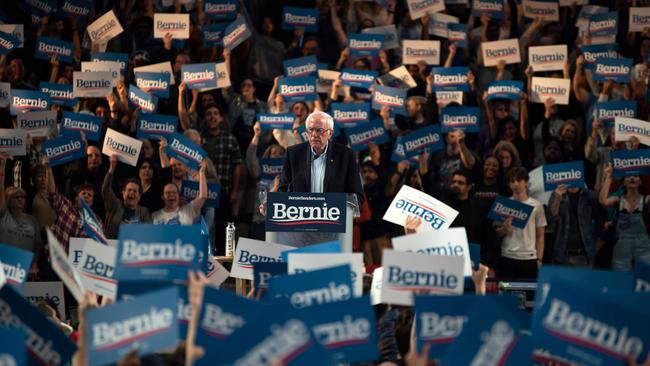
It’s a combination no other contender has and if Sanders performs well in South Carolina and again on Super Tuesday — where polls suggest he will win the large delegate-rich states of California and Texas — he will become the red-hot, if not unbackable, favourite for the nomination.
His three main challengers — Biden, Bloomberg and Buttigieg — all face substantial obstacles to win the nomination and each needs a breakout moment in this next week to remain a serious challenger.
Biden’s moment of truth will come in South Carolina, where he leads the polls largely because of solid support from African-Americans, who comprise the majority of primary voters in that state.
A new poll, from Monmouth University, released on Friday, suggests Biden is on track to win South Carolina easily and has extended his lead over Sanders; he has 36 per cent compared with 16 per cent for Sanders.
The 77-year-old has boasted for months that he will win the state, and his campaign will be doomed if he doesn’t. Knowing this, Biden, alone among the candidates, has spent all this week in South Carolina trying to shore up a win he hopes will resurrect his faltering campaign.
“South Carolina chooses presidents,” Biden said on the campaign trail this week. “You decided to launch Bill Clinton to the White House and up to that time it didn’t look like he was going very far — but you did. You launched my buddy, Barack Obama, to the White House. I firmly believe, once again, you hold in your hands, in South Carolina, the power to choose the next president of the United States.”
But this is Biden’s third presidential campaign and he has yet to win a single primary or caucus. So far this year he has finished fourth, fifth and second. These poor results have seen him slide in national polls. He has invested little time or money in the 14 Super Tuesday states so he needs a strong win in South Carolina to make him competitive on Super Tuesday.
Although Biden performed relatively well in the bruising debate in Charleston this week, his appearances on the hustings remain underwhelming and riddled with gaffes.
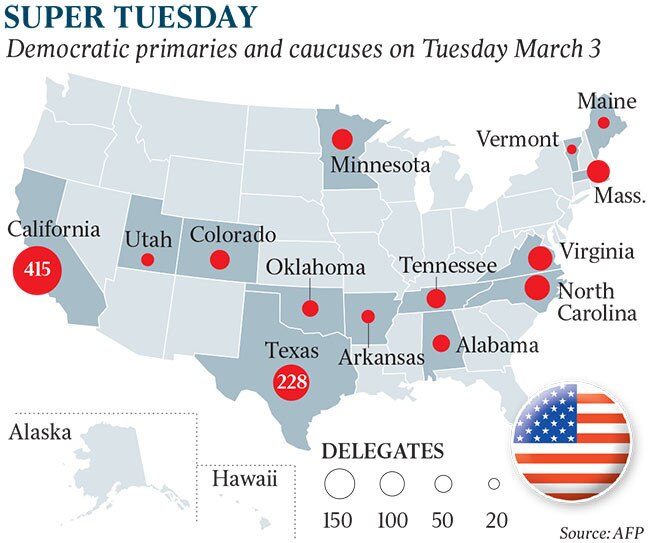
During the debate he claimed 150 million Americans — almost half the population — had been killed by guns since 2007 (the number is 373,633). This week he claimed he was running for the US Senate rather than the presidency and said he negotiated the Obama-era Paris climate deal with Deng Xiaoping, the Chinese leader who died in 1997.
Even so, if Biden performs well on Sunday he will emerge as the moderate candidate most likely to challenge Sanders.
Biden’s main moderate rival, Bloomberg, is also beset with challenges as Americans get to know him in person beyond his slick, $400m-plus national advertising blitz. Bloomberg is not contesting South Carolina and will enter the primary race for the first time on Super Tuesday, when a third of the delegates for the Democratic National Convention will be decided. Only then will we get an appraisal — all at once — of how electable Bloomberg is.
After rising as high as second in the polls on the back of his unprecedented advertising campaign, the former New York mayor has fallen back to Earth after his poor showings in both debates.
These performances, and a CNN town hall appearance this week, have revealed to voters his potentially fatal lack of charisma. He has also struggled to shake off damaging attacks from his rivals over previous comments about women in his company and his “stop-and-frisk” policing policy as mayor, which saw disproportionate arrests among minorities.
Coming into the race so late means Bloomberg will have to perform strongly on Super Tuesday to gather the momentum required to catch Sanders, who has contested all four early states. National polls have Bloomberg coming third on 14.4 per cent, behind Biden on 18 per cent and Sanders on 29.2 per cent.
The next week is also likely to decide the fate of Buttigieg — the best debate performer — who has exceeded expectations but who faces a difficult road to the nomination. The 38-year-old’s campaign is set to be hit by a poor performance in South Carolina, where he is polling in fifth place with only 6.3 per cent (RealClear Politics). This is due to his ongoing inability to connect with black voters, many of whom are wary of his record with minorities from his time as mayor of South Bend, Indiana. Some are also uncomfortable about supporting a gay candidate.
Buttigieg invested all he had in the early voting states of Iowa and New Hampshire. He is short of cash and does not have a strong national organisation like Sanders to sustain a long campaign. His only hope is to defy the polls and secure a stronger-than-expected result on Super Tuesday. This could somehow create enough momentum to leave him last man standing among the moderates.
As things stand, it is difficult to see the remaining contenders — Warren, Amy Klobuchar, Tom Steyer and Tulsi Gabbard (who is in the race in name only) — securing enough support in the coming week to remain long-term viable challengers.
The existence of so many moderate candidates at this stage of the race is dividing the moderate Democrat vote and giving Sanders an easy run. Despite this, there is no sign any of the moderates plan to step aside any time soon to throw their support behind a single moderate candidate.
This week Sanders belatedly came under fire from all sides as his rivals tried to halt his run before it is too late. He was assailed over his big-spending policies including how he would fund his Medicare for All plan, his record on gun control, his sympathy towards authoritarian regimes and how he would win the votes of moderate voters with his socialist agenda.
Bloomberg and Buttigieg bluntly voiced the fears of the moderate wing of the party when they claimed that by nominating Sanders Democrats risked not only ceding the election to Trump, but losing their majority in the house.
“Bernie will lose to Donald Trump. And Donald Trump, and the house, and the Senate and some of the state houses will all go red, and then between gerrymandering and appointing judges for the next 20 or 30 years, we’re going to live with this catastrophe,” Bloomberg said.
Buttigieg said Sanders’s platform of Medicare for all without a private option, free college tuition, wealth taxes, high middle-class taxes and a $US15 ($23)-an-hour minimum wage would alienate the moderate voters, especially in the Midwest, who led the revolt against Trump in the 2018 midterm elections and delivered the Democrat majority in the house.
“If you want to keep the house in Democratic hands, you might want to check with the people who actually turned the house blue — 40 Democrats who are not running on your platform. They are running away from your platform as fast as they possibly can,” Buttigieg said.
Sanders’s opponents point to his comments this week — in which he praised former Cuban dictator Fidel Castro’s education policies — as an example of how he would gift the election to Trump. Sanders’s praise for Castro was slammed in Florida — a vital swing state the Democrats must win, but which is home to a powerful bloc of ferociously anti-Castro Cuban immigrants.
As the battle between the contenders became a bare-knuckle brawl — giving valuable fodder to Trump’s campaign — house Speaker Nancy Pelosi tried in vain to hold the divided party together.
She claimed, without naming Sanders, that “whoever our nominee is, we will enthusiastically embrace, and we will win the White House, the Senate and the House of Representatives. I would hope that everyone would say, no matter who the nominee is for president, we wholeheartedly embrace that person”.
But concern about Sanders runs deep. The New York Times this week interviewed 93 Democrat officials who will act as superdelegates at the Democratic convention and found “overwhelming opposition” to handing Sanders the nomination if he falls short of a simple majority of delegates before July.
In other words, they would seriously consider a rare contested convention — the first since 1952 for the Democrats — to give another candidate the nomination even if Sanders has the most delegates going in, but is short of the 50 per cent, or 1191 delegates, needed to secure the nomination automatically on the first ballot.
There is a long way to go before the party confronts such a choice. But this week Democrat voters will give the clearest signal yet of what sort of candidate they want to challenge the President in November.
Cameron Stewart is also
US Contributor for Sky News Australia.


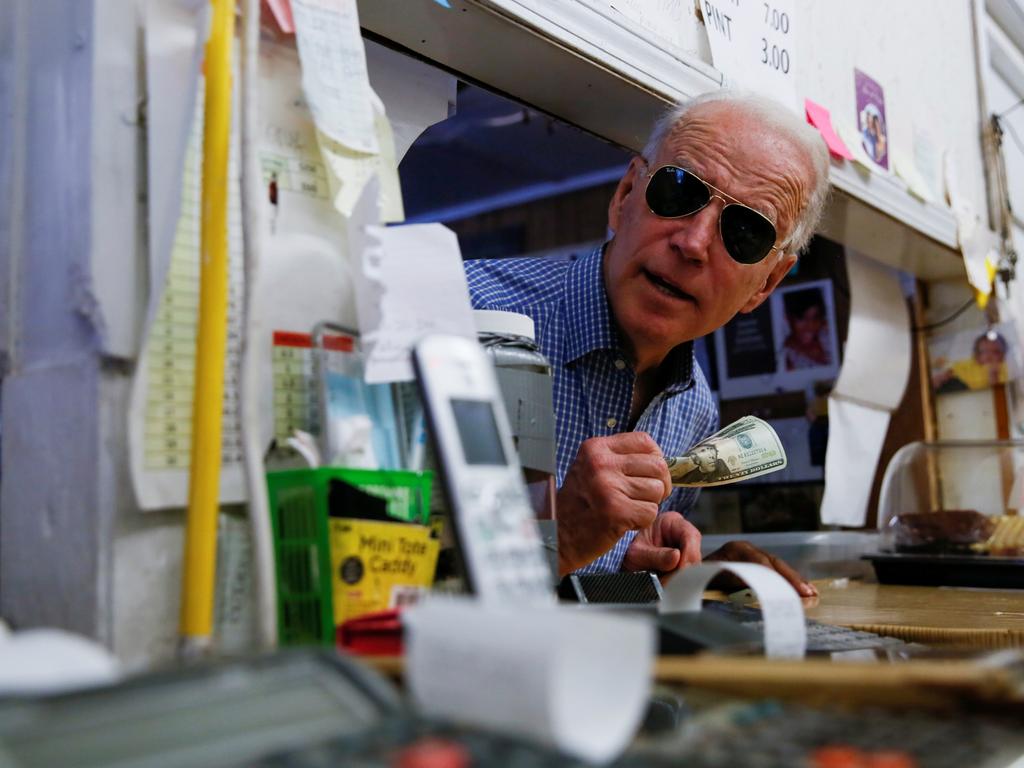
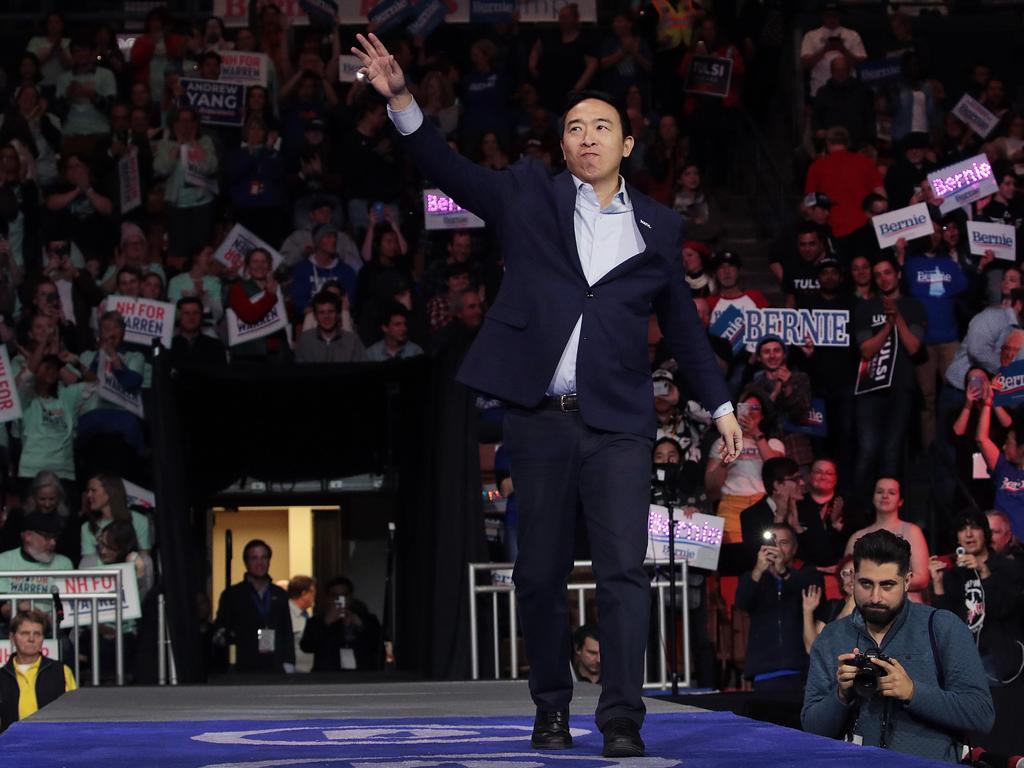
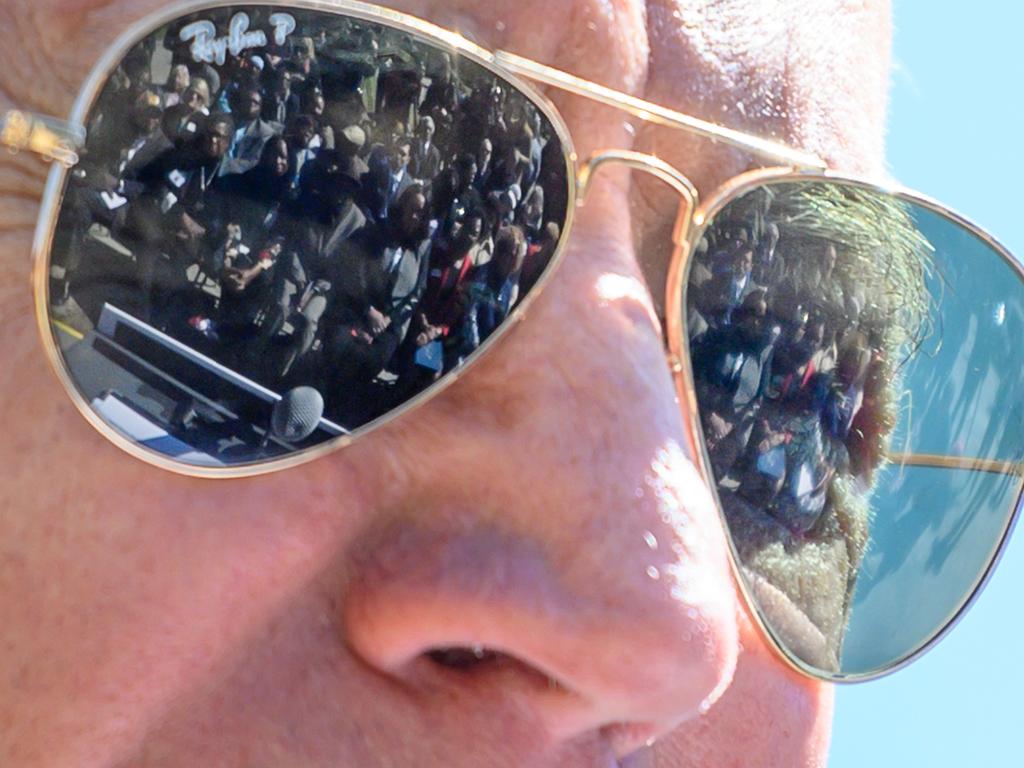



The coming week is not only the most important of the Democratic presidential race, it is a fork in the road for American liberals to decide which path has the best chance of taking them back to the White House.